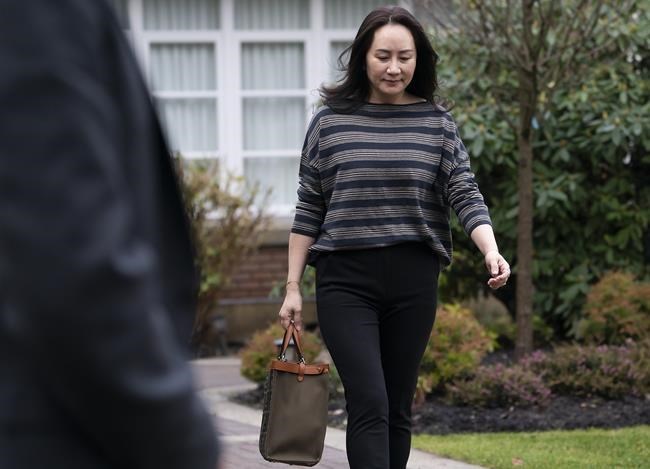VANCOUVER — An RCMP officer who oversaw the arrest of Meng Wanzhou two years ago says she is not aware of any Mounties sharing information from the Huawei executive's electronics with U.S. law enforcement.
Sgt. Janice Vander Graaf was head of the foreign and domestic liaison unit tasked in 2018 to take Meng into custody, an arrest that soured Canada's relations with China.
Vander Graaf told the B.C. Supreme Court Wednesday that her subordinate Const. Gurvinder Dhaliwal, who documented and secured Meng's seized electronics, initially told her that a senior officer in the RCMP's financial integrity unit had shared the serial numbers for the devices with the Federal Bureau of Investigation.
However, Vander Graaf told the evidentiary hearing in Meng's extradition case that she soon believed that wasn't accurate, after Dhaliwal shared emails related to what he reported.
"I realized that it didn't say exactly what Const. Dhaliwal had told me," Vander Graaf said under questioning by John Gibb-Carsley, a lawyer for Canada's attorney general.
"It didn't say that Ben Chang had provided serial numbers."
Instead, she said, she understood the email to mean Staff Sgt. Ben Chang would go through legal channels to obtain authorization to share the devices with U.S. officials.
Meng's lawyer Scott Fenton challenged that interpretation during cross-examination, but Vander Graaf would not agree that Chang meant he would send the serial numbers to the FBI.
"I can't make that deduction that it would be the serial numbers, it just says 'info' here," she said.
Dhaliwal has testified that he doesn't recall having a conversation with Chang about the electronics beyond the email that he shared.
The court has heard that Chang has obtained counsel and will not testify.
About 10 RCMP and Canada Border Services Agency officials are testifying as part of the evidence-gathering hearing in Meng's extradition case. Their testimony may be used by Meng's lawyers when they argue next year that she was subject to an abuse of process.
Meng is wanted in the United States on charges of fraud over allegations related to U.S. sanctions against Iran that both she and tech giant Huawei deny.
The court has heard that Meng was taken to a secondary screening area after her plane landed at Vancouver's airport on Dec. 1, 2018.
Her phones were placed in special bags to prevent remote erasure and her electronics were handed to RCMP upon her arrest, court has heard.
Dhaliwal testified earlier that one of the border officers handed him a piece of paper with the passcodes to Meng's phones along with the electronics.
That border officer told the court that he only realized the "heart-wrenching" personal error he made days later, when he saw the paper was missing.
On Wednesday, Vander Graaf said Dhaliwal told her while they were still at the airport that the passcodes were in the bag with the devices and he asked her what he should do.
Vander Graaf told the court she believed Dhaliwal had not asked for the passcodes and considered giving back the paper now that it was in his possession.
"I told him that he couldn't unseize something that he'd already seized, so he should log those passcodes and explain how he came in possession of those," Vander Graaf said.
Giving them back would have been less transparent, she said.
"It just seemed very clear to me that once we have them, we have to just explain why we have them," she said.
Vander Graaf told the court that a key and passcodes for Meng's residence were also collected so that they could be shared with Meng's friend, who would take her luggage to her home following the arrest.
She said RCMP had no plans to seize Meng's eight pieces of luggage and the remand centre would not accept that many bags.
Vander Graaf said the arrangement was agreed upon between RCMP, Meng and her friend.
She said under cross-examination that she did not believe it was unreasonable for CBSA to conduct its exam before RCMP executed the arrest.
Although her own superior had suggested arresting Meng on the plane, Vander Graaf echoed the safety concerns of a subordinate who conducted the arrest.
"In my experience, arrests are always unpredictable, even the most seemingly easy arrest," she said.
She also testified that she asked a CBSA officer about legal information-sharing mechanisms in advance of the arrest because she was concerned that if there were any incidents with the arrest, then the RCMP may want to request security video footage.
This report by The Canadian Press was first published Nov. 25, 2020.
Amy Smart, The Canadian Press



